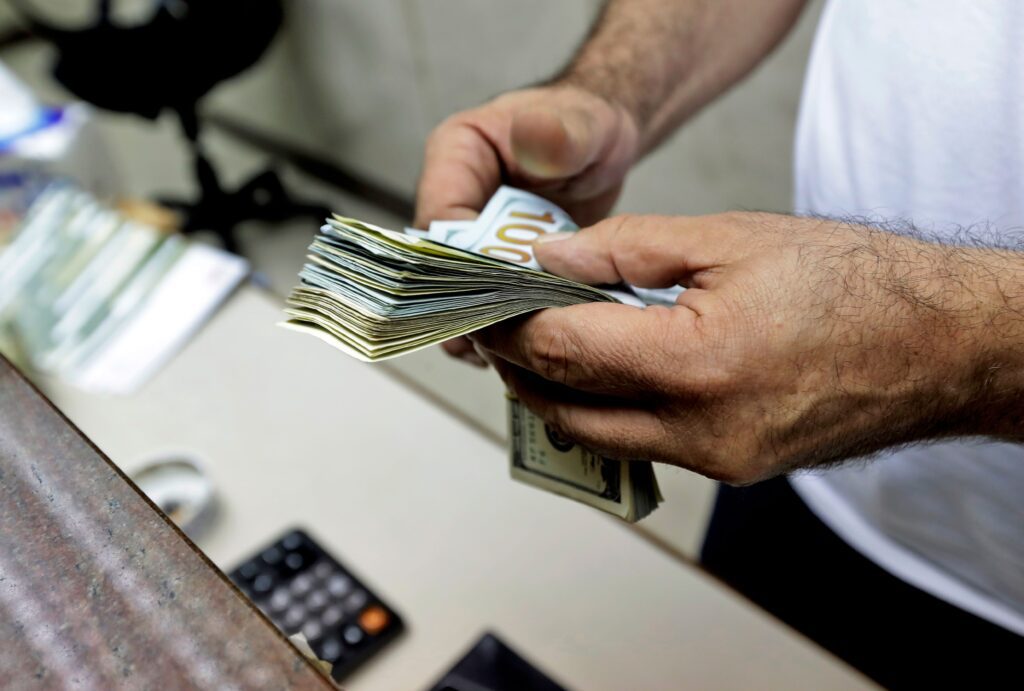Lebanon has been going through one of the worst socioeconomic impasses in recent history. The recent Israeli aggression on the country’s southern borders has accentuated difficulties for the country’s most vulnerable groups, who have already suffered from back-to-back crises such as the COVID-19 pandemic, the Beirut Port Explosion and the Tleil Fire.
Among the manifestations of such crises, the country’s currency witnessed an immense deterioration in its exchange value, dropping from 1,515 LBP/USD in early 2019 to 89,500 LBP/USD as of mid-2023.
As a result, service providers, businesses and educational and healthcare institutions, among others, have increasingly dollarized prices for the last four years. This translated to a continued fall in consumers’ purchasing power, given a lack of adequate wage compensation for the majority of the country’s population.
Since late 2023, however, the exchange rate has been at a stable 89,500 LBP/US, yet inflation rates have remained in the triple digit sphere with the exception of the month of March.
While supermarkets and big retailers have continued to use dollarization as an excuse for rising consumer prices, the root of the problem is evidently elsewhere, and is rooted in questions of political economy.
Lack of Monitoring and Free Reign for Big Retailers
Last month, Caretaker Minister of Economy Amin Salam conducted visits to various sectors to inspect the rising prices of consumer goods, with a particular focus on food markets. This comes amid rising complaints of price disparities between different commercial institutions.
Indeed, everyday citizens in Lebanon have voiced out concerns similar to “you can get the exact same product from two stores, but each would price them differently.”
Sometimes, the two stores would be in the same district or even at a walking distance, and yet such disparities are continually permitted to take place.
More recently, the Lebanese government has increased minimum wage rates in both the public and private sphere, doubling in the latter from LBP nine million to LBP 18 million, i.e., to around $200 per month.
While such measures, similar to the minister’s round of inspections, point to steps in the right direction, they remain awfully far from addressing the root cause of the issue.
Since the country’s independence, and even more so after its 15-year civil war, Lebanon has been a pioneer in neoliberalism whereby pretexts of “free market” have been used to justify a complete lack of price monitoring, control over the formation of monopolies and the privatization of social services.
The Myth of a Crippled Political System
Dominated by a political economy centered around the intricate networks formed between businessmen, bankers and ruling class political elites, the country’s “regime” is far from the widespread myth of being crippled by the crisis.
On the contrary, the elites’ interests are up and running in what has been an ongoing capitalization of the crisis, benefitting from the increasing trend of privatization and the decreasing coverage of public provision and monitoring.
This is true on different fronts.
The banking sector continues to evade responsibility for the dissipation of depositors’ funds, security forces and political parties continue to crack down on refugees, marginalized groups and civil society organizations, and big retailers continue to dominate the current market structures.
Far from sustainable, the solutions that the state has looked at remain extremely palliative in nature. Upcoming negotiations with the International Monetary Fund and the World Bank, on their part, continue to be obstructed due to the ruling class’s failure to compromise on their financial interests.
On the international scene, a recent agreement with the European Union saw the delivery of one billion dollars in aid (over four years) directed towards border management and patrol of illegal immigration. As has been the trend for the last few years, such funds are highly unlikely to reach those most in need, and are expected to fall in the black hole that is state apparatuses.
In fact, the system is better described as operating on steroids, with the only thing being crippled is services and livelihood opportunities for those most impacted by the crisis.
Low-Hanging Fruits
Among the concessions that the ruling class is refusing to make in negotiations with international financial institutions, a few central ones can be pointed out, and operate as low-hanging fruits to revitalize the current state of the Lebanese economy:
- Imposing a progressive taxation system that tackles extreme concentrations of wealth, income, land and capital. Indeed, Lebanon continues to lack a tax on wealth. Its tax on property, on its part, misses out on the abundance of vacant apartments which comprise as much as 23 percent of apartments in Beirut. Taxes on income, also, continue to be below par and inadequately adjusted for inflation, in addition to the fact that various sources of income for one individual taxpayer are taxed in a separate manner as opposed to a unified one.
- Utilizing a small portion of the security measures used on marginalized groups to crack down on big retailers’ control of consumer prices and the volatile fluctuations in the markets.
- Restructuring the banking sector and adopting the findings of the report by audit company Alvarez and Marcel, while prioritizing the protection of small-to-medium depositors’ funds.
While these are some of the low-hanging fruits that can be tackled in a relatively short period of time, long term measures are more fundamental in nature, addressing the dreaded state of the country’s current social contract, and ushering in a new wave of political leaders.
